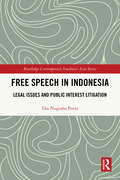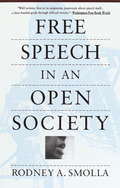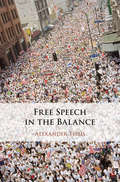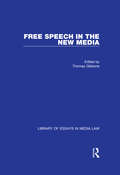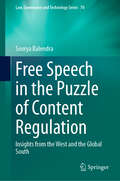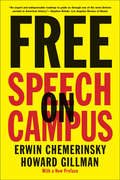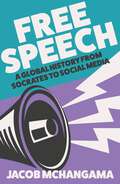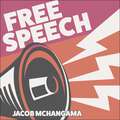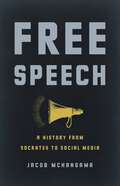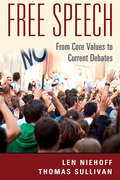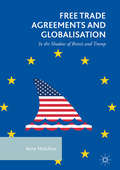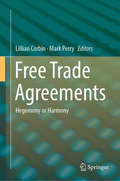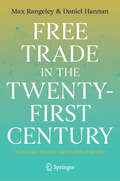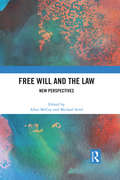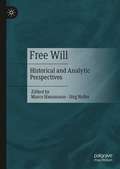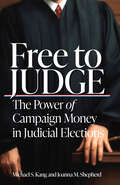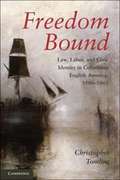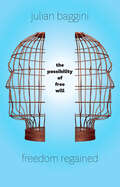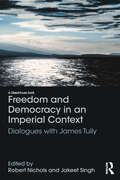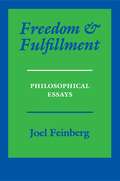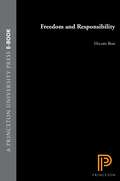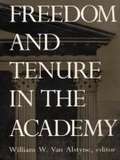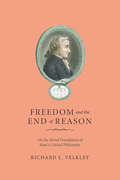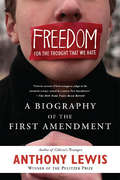- Table View
- List View
Free Speech in Indonesia: Legal Issues and Public Interest Litigation (Routledge Contemporary Southeast Asia Series)
by Eka Nugraha PutraThis book discusses the practice of free speech and its limitations – defamation and hate speech – in the context of Indonesia.Focusing on several legislations, mainly in the Indonesian Criminal Code (KUHP) and the Information and Electronic Transaction Law (The ITE Law), the analysis centers on defamation and hate speech and how public interest defense is implemented in such limitations. The book discusses free speech in Indonesia through historical context and legal framework, both national and international. Detailed analyses of laws and case studies are provided, and the author examines key judicial decisions in defamation and hate speech cases that occurred in offline and online realms. The book demonstrates that Indonesia has ratified international human rights frameworks but that democracy in Indonesia has been declining in recent years, particularly due to the restrictions on free speech imposed by laws, which has resulted in a significant increase in cases involving free speech limitations.Offering a much-needed analysis of free speech and its implementation in Indonesia, this book will be of interest to academics studying Southeast Asia, Indonesia, Human Rights, Media Law, and Law in Asia.
Free Speech in an Open Society
by Rodney A. SmollaThis grand tour of First Amendment law underlines the intimate connection between free expression and democratic values as it leads us through the most treacherous and emotionally charged cases in American jurisprudence. “Intellectually venturesome. . . . ”—The New York Times Book Review
Free Speech in the Balance
by Alexander TsesisFree Speech in the Balance is the first comprehensive study of proportional analysis in free speech theory. This book challenges the US Supreme Court's categorical approach and explains the importance of understanding the breadth of concerns arising from regulations directly and indirectly impacting expression. The author provides in-depth analysis of some of the important social and political principles governing topics of vital concern, including campaign financing, university speech codes, secondary school rules, incitement, and threats. This book should be read by students and scholars of free speech theory and anyone interested in learning more about the history of existing law, the issues of current importance, and trends in expressive significance.
Free Speech in the New Media (Library of Essays in Media Law)
by Thomas GibbonsThis volume deals with questions of political and constitutional principle and theory that affect the law and regulation of content in new media that are based on digital technology. In the light of convergence between different forms of communication, it examines whether the justifications for government intervention in traditional analogue broadcasting and programme delivery continue to be persuasive. The essays examine in general whether new approaches to freedom of expression are required in the digital era and whether there is a continued role for public service broadcasting or its equivalent. They also explore content standards in more detail, discussing arguments for and against regulation in the areas of beliefs, indecency and advertising and whether there is a case for the European Union's measures to secure "Television without Frontiers".
Free Speech in the Puzzle of Content Regulation: Insights from the West and the Global South (Law, Governance and Technology Series #20)
by Soorya BalendraThis book explores the intersection of law and technology, focusing on online speech regulations and their complex interplay with free speech in the digital age. It identifies three primary regulatory models – self-regulation, external regulation, and co-regulation – and examines how each model presents recurring challenges in both content moderation and the protection of free speech. The study delves into the regulation of harmful speech, including defamation, violence, misinformation, and propaganda, highlighting the tensions between regulating prohibited content and preserving free speech online. Additionally, the book addresses digital authoritarianism and its manifestation in regulatory approaches, particularly the Chinese model of content regulation. It also scrutinizes platform-driven regulation, assessing the challenges posed by both human and AI-driven content moderation. Through a comparative analysis of legal frameworks across key jurisdictions – including the United States (Section 230 of the Communications Decency Act), Germany (the Network Enforcement Act), India (the Information Technology (Intermediary Guidelines and Digital Media Ethics Code) Rules, 2021), and Sri Lanka (the Online Safety Act, 2024) – the book examines how these frameworks navigate the balance between free speech rights and platform responsibilities, in these jurisdictions with the distinct context, power asymmetry of authorities with the platforms, political and cultural landscape, and social media market. It further explores how these evolving models reflect significant differences in the roles of governments, platforms, regulatory authorities, standards, and compliance mechanisms. By engaging in a scholarly discussion on these issues from a legal and regulatory perspective, this book seeks to strike a balance between online free speech and legitimate restrictions. It provides a comparative lens on Western jurisprudence and the Majority World, linking common themes across jurisdictions to shed light on the intricate challenges of regulating online speech. In doing so, the book addresses a gap in the existing literature, offering a much-needed foundation for developing and updating both internal and external regulatory frameworks.
Free Speech on Campus
by Erwin Chemerinsky Howard GillmanCan free speech coexist with an inclusive campus environment? Hardly a week goes by without another controversy over free speech on college campuses. On one side, there are increased demands to censor hateful, disrespectful, and bullying expression and to ensure an inclusive and nondiscriminatory learning environment. On the other side are traditional free speech advocates who charge that recent demands for censorship coddle students and threaten free inquiry. In this clear and carefully reasoned book, a university chancellor and a law school dean—both constitutional scholars who teach a course in free speech to undergraduates—argue that campuses must provide supportive learning environments for an increasingly diverse student body but can never restrict the expression of ideas. This book provides the background necessary to understanding the importance of free speech on campus and offers clear prescriptions for what colleges can and can’t do when dealing with free speech controversies.
Free Speech: A Global History from Socrates to Social Media
by Jacob MchangamaA global history of free speech, from the ancient world to today.Hailed as the "first freedom," free speech is the bedrock of democracy. But it is a challenging principle, subject to erosion in times of upheaval. Today, in democracies and authoritarian states around the world, it is on the retreat.In Free Speech, Jacob Mchangama traces the riveting legal, political, and cultural history of this idea. Through captivating stories of free speech's many defenders - from the ancient Athenian orator Demosthenes and the ninth-century freethinker al-Razi, to Mary Wollstonecraft, Mahatma Gandhi, Nelson Mandela and modern-day digital activists - Mchangama demonstrates how the free exchange of ideas underlies all intellectual achievement and has enabled the advancement of both freedom and equality worldwide. Yet the desire to restrict speech is also a constant, and he explores how even its champions can be led down this path when the rise of new and contrarian voices challenge power and privilege of all kinds.Meticulously researched, deeply humane and provocative, Free Speech challenges us all to recognise how much we have gained from this principle - and how much we stand to lose without it.
Free Speech: A Global History from Socrates to Social Media
by Jacob MchangamaA global history of free speech, from the ancient world to today.Hailed as the "first freedom," free speech is the bedrock of democracy. But it is a challenging principle, subject to erosion in times of upheaval. Today, in democracies and authoritarian states around the world, it is on the retreat.In Free Speech, Jacob Mchangama traces the riveting legal, political, and cultural history of this idea. Through captivating stories of free speech's many defenders - from the ancient Athenian orator Demosthenes and the ninth-century freethinker al-Razi, to Mary Wollstonecraft, Mahatma Gandhi, Nelson Mandela and modern-day digital activists - Mchangama demonstrates how the free exchange of ideas underlies all intellectual achievement and has enabled the advancement of both freedom and equality worldwide. Yet the desire to restrict speech is also a constant, and he explores how even its champions can be led down this path when the rise of new and contrarian voices challenge power and privilege of all kinds.Meticulously researched, deeply humane and provocative, Free Speech challenges us all to recognise how much we have gained from this principle - and how much we stand to lose without it.(P) 2022 Hodder & Stoughton Limited
Free Speech: A History from Socrates to Social Media
by Jacob Mchangama&“The best history of free speech ever written and the best defense of free speech ever made.&” —P.J. O&’RourkeHailed as the &“first freedom,&” free speech is the bedrock of democracy. But it is a challenging principle, subject to erosion in times of upheaval. Today, in democracies and authoritarian states around the world, it is on the retreat.In Free Speech, Jacob Mchangama traces the riveting legal, political, and cultural history of this idea. Through captivating stories of free speech&’s many defenders—from the ancient Athenian orator Demosthenes and the ninth-century freethinker al-Rāzī, to the anti-lynching crusader Ida B. Wells and modern-day digital activists—Mchangama reveals how the free exchange of ideas underlies all intellectual achievement and has enabled the advancement of both freedom and equality worldwide. Yet the desire to restrict speech, too, is a constant, and he explores how even its champions can be led down this path when the rise of new and contrarian voices challenge power and privilege of all stripes.Meticulously researched and deeply humane, Free Speech demonstrates how much we have gained from this principle—and how much we stand to lose without it.
Free Speech: From Core Values to Current Debates
by Thomas Sullivan Len NiehoffWhy do we protect free speech? What values does it serve? How has the Supreme Court interpreted the First Amendment? What has the Court gotten right and wrong? Why are current debates over free expression often so divisive? How can we do better? In this succinct but comprehensive and scholarly book, authors Len Niehoff and Thomas Sullivan tackle these pressing questions. Free Speech: From Core Values to Current Debates traces the development and evolution of the free speech doctrine in the Supreme Court and explores how the Court - with varying levels of success - has applied that doctrinal framework to “hard cases” and current controversies, such as those involving hate speech, speech on the internet, speech on campus, and campaign finance regulation. This is the perfect volume for anyone - student, general reader, or scholar - looking for an accessible overview of this critical topic.
Free Trade Agreements and Globalisation: In the Shadow of Brexit and Trump
by Arne MelchiorThis book analyses the fast spread of free trade agreements (FTAs) across the globe, their content and their economic impact. In the wake of Brexit and the new protectionism of President Trump, Melchior offers a timely assessment of key issues relating to FTAs.Dividing the world into seven major regions, he analyses world trade, the globalisation of FTAs and their role within and between the regions. Using a new world trade model, he then presents new evidence on the impact of trade agreements, the value of trade, the impact of China’s growth and the West’s industrial decline, and the role of reciprocity in trade policy. Covering rich and poor countries, commodity exporters and all of the world’s regions, he offers new and original insights about a number of pertinent issues facing today’s world.
Free Trade Agreements: Hegemony Or Harmony
by Mark Perry Lillian CorbinThis book brings together international perspectives on free trade issues that affect civil society from the general populace to the governments of nations, and is relevant not only for lawyers, but also policymakers, international actors and businesses, as well as those with a general interest in free trade agreements. The book examines the manifestation of the concept of free trade in agreements, such as the Trans-Pacific Partnership (TPP), Regional Comprehensive Economic Partnership (RCEP), and China-Australia Free Trade Agreement (ChAFTA). It asks whether such agreements are entered into for the purposes of enhancing trading relationships between partner nations, strengthening commercial ties, and fostering economic growth; or are they sometimes used merely for local political outcomes of the most influential nations.
Free Trade in the Twenty-First Century: Economic Theory and Political Reality
by Daniel Hannan Max RangeleyThis book offers an assessment of the benefits and contemporary relevance of free trade. With contributions from senior policy-makers—ranging from former prime ministers of Australia and the United Kingdom to ambassadors and political figures who have worked on trade negotiations—as well as some of the most prestigious academics in the field of trade, from a Nobel Prize winner to esteemed economic historians, it teaches how important free trade is to prosperity in this day and age. This book brings together the key approaches to free trade in the modern world, including the practical realities of negotiating trade agreements, how we can move towards a system of genuine free trade and the moral case for free trade. Each chapter in Free Trade in the Twenty-First Century has an eminent expert in the field addressing a specific aspect of modern trade. With a single book, one can gain an understanding of the most important themes, from the impact monetary economics has on trade to the intricacies of free trade agreements. By having chapters written by political figures, trade negotiators and think tank analysts, this book takes trade beyond abstruse economic theory and brings it into political reality so that the reader can understand how we can use trade to create global peace and prosperity.
Free Will and the Law: New Perspectives
by Allan McCay Michael SevelThis volume brings together many of the world’s leading theorists of free will and philosophers of law to critically discuss the ground-breaking contribution of David Hodgson’s libertarianism and its application to philosophy of law. The book begins with a comprehensive introduction, providing an overview of the intersection of theories of free will and philosophy of law over the last fifty years. The eleven chapters collected together divide into two groups: the first five address libertarianism within the free will debate, with particular attention to Hodgson’s theory, and in Part II, six contributors discuss Hodgson’s libertarianism in relation to issues not often pursued by free will scholars, such as mitigation of punishment, the responsibility of judges, the nature of judicial reasoning and the criminal law process more generally. Thus the volume’s importance lies not only in examining Hodgson’s distinctive libertarian theory from within the free will literature, but also in considering new directions for research in applying that theory to enduring questions about legal responsibility and punishment.
Free Will: Historical and Analytic Perspectives
by Jörg Noller Marco HausmannThis novel contributed volume advances the current debate on free will by bridging the divide between analytic and historically oriented approaches to the problem. With thirteen chapters by leading academics in the field, the volume is divided into three parts: free will and determinism, free will and indeterminism, and free will and moral responsibility. The contributors aim to initiate a philosophical discourse that profits from a combination of the two approaches. On the one hand, the analytic tools familiar from the debate – arguments, concepts, and distinctions – can be used to sharpen our understanding of classical philosophical positions. On the other hand, the rich philosophical tradition can be reconstructed so as to inspire new solutions. In recent years, the problem of free will has received special attention in the analytic arena. This is the first anthology to combine historical and analytic perspectives, significantly furthering the debate, and providing a crucial resource to academics and advanced students alike.
Free to Judge: The Power of Campaign Money in Judicial Elections
by Michael Kang Joanna ShepherdThe idea that wealthy people use their money to influence things, including politics, law, and media will surprise very few people. However, as Michael S. Kang and Joanna Shepherd argue in this readable and rich study of the state judiciary, the effect of money on judicial outcomes should disturb and anger everyone. In the current system that elects state judges, the rich and powerful can spend money to elect and re-elect judges who decide cases the way they want. Free to Judge is about how and why money increasingly affects the dispensation of justice in our legal system, and what can be done to stop it. One of the barriers to action in the past has been an inability to prove that campaign donations influence state judicial decision-making. In this book, Kang and Shepherd answer that challenge for the first time, with a rigorous empirical study of campaign finance and judicial decision-making data. Pairing this with interviews of past and present judges, they create a compelling and persuasive account of people like Marsha Ternus, the first Iowa state supreme court justice to be voted out of office after her decision in a same-sex marriage case. The threat of such an outcome, and the desire to win reelection, results in judges demonstrably leaning towards the interests and preferences of their campaign donors across all cases. Free to Judge is thus able to identify the pieces of our current system that invite bias, such as judicial reelection, and what reforms should focus on. This thoughtful and compellingly written book will be required reading for anybody who cares about creating a more just legal system.
Freedom Bound: Law, Labor, and Civic Identity in Colonizing English America, 1580-1865
by Christopher TomlinsFreedom Bound is about the origins of modern America - a history of colonizing, work, and civic identity from the beginnings of English presence on the mainland until the Civil War. It is a history of migrants and migrations, of colonizers and colonized, of households and servitude and slavery, and of the freedom all craved and some found. Above all it is a history of the law that framed the entire process. Freedom Bound tells how colonies were planted in occupied territories, how they were populated with migrants - free and unfree - to do the work of colonizing, and how the newcomers secured possession. It tells of the new civic lives that seemed possible in new commonwealths, and of the constraints that kept many from enjoying them. It follows the story long past the end of the eighteenth century until the American Civil War, when - just for a moment - it seemed that freedom might finally be unbound.
Freedom Bound: Law, Labor, and Civic Identity in Colonizing English America, 1580–1865
by Christopher TomlinsFreedom Bound is about the origins of modern America - a history of colonizing, work and civic identity from the beginnings of English presence on the mainland until the Civil War. It is a history of migrants and migrations, of colonizers and colonized, of households and servitude and slavery, and of the freedom all craved and some found. Above all it is a history of the law that framed the entire process. Freedom Bound tells how colonies were planted in occupied territories, how they were populated with migrants - free and unfree - to do the work of colonizing and how the newcomers secured possession. It tells of the new civic lives that seemed possible in new commonwealths and of the constraints that kept many from enjoying them. It follows the story long past the end of the eighteenth century until the American Civil War, when - just for a moment - it seemed that freedom might finally be unbound.
Freedom Regained: The Possibility of Free Will
by Julian Baggini“For anyone who has ever given serious thought to the degree to which our actions are within our own control, Freedom Regained will give you a lot to chew on.” —Spectrum CultureIt’s a question that’s puzzled philosophers and theologians for centuries and is at the heart of numerous political, social, and personal concerns: Do we have free will? In this cogent, compelling book, Julian Baggini explores the concept of free will from every angle, blending philosophy, sociology, and cognitive science to find rich new insights on the intractable questions that plague us. Are we products of our culture, or free agents within it? Are our neural pathways fixed early on by a mix of nature and nurture, or is the possibility of comprehensive, intentional psychological change always open to us? And what, exactly, are we talking about when we talk about “freedom” anyway?Freedom Regained brings the issues raised by the possibilities—and denials—of free will to thought-provoking life, drawing on scientific research and fascinating encounters with everyone from artists to prisoners to dissidents. Baggini looks at what it means to be material beings in a universe of natural laws. He asks if there’s any difference between ourselves and the brains from which we seem never able to escape. He throws down the wild cards and plays them to the fullest: What about art? What about addiction? What about twins? And he asks, of course, what this all means for politics.Ultimately, Baggini challenges those who think free will is an illusion. Moving from doubt to optimism to a hedged acceptance of free will, he ultimately lands on a satisfying conclusion: It is something we earn. The result is a highly engaging, new, and more positive understanding of our sense of personal freedom, a freedom that is definitely worth having.“Entertaining.” —The Wall Street Journal“While firmly rooted in the philosophical tradition, Baggini also gets out and talks to people for whom freedom—and lack of it—is a real and pressing matter.” —Literary Review
Freedom and Democracy in an Imperial Context: Dialogues with James Tully
by Robert Nichols Jakeet SinghFreedom and Democracy in an Imperial Context: Dialogues with James Tully gathers leading thinkers from across the humanities and social sciences in a celebration of, and critical engagement with, the recent work of Canadian political philosopher James Tully. Over the past thirty years, James Tully has made key contributions to some of the most pressing questions of our time, including: interventions in the history of moral and political thought, contemporary political philosophy, democracy, citizenship, imperialism, recognition and cultural diversity. In 2008, he published Public Philosophy in a New Key, a two-volume work that promises to be one of the most influential and important statements of legal and political thought in recent history. This work, along with numerous other books and articles, is foundational to a distinctive school of political thought, influencing thinkers in fields as diverse as Anthropology, History, Indigenous Studies, Law, Philosophy and Political Science. Critically engaging with James Tully’s thought, the essays in this volume take up what is his central, and ever more pressing, question: how to enact democratic practices of freedom within and against historically sedimented and actually existing relationships of imperialism?
Freedom and Fulfillment: Philosophical Essays
by Joel FeinbergDealing with a diverse set of problems in practical and theoretical ethics, these fourteen essays, three of them previously unpublished, reconfirm Joel Feinberg's leading position in the field of legal philosophy. With a clarity and humor that will be familiar to readers of his other works, Feinberg writes on topics including "wrongful life" suits in the law of torts, or whether there is any sense in the remark that a person is so badly off that he would be better off not existing at all; the morality of abortion; educational options; free expression; civil disobedience; and the duty of easy rescue in criminal law. He continues with a three-part defense of moral rights in the abstract, a discussion of voluntary euthanasia, and an inquiry into arguments of various kinds for not granting legal rights in enforcement of a person's acknowledged moral rights. This collection concludes with two essays dealing with concepts used in appraising the whole of a person's life: absurdity and self-fulfillment, and their interplay.
Freedom and Responsibility
by Hilary BokCan we reconcile the idea that we are free and responsible agents with the idea that what we do is determined according to natural laws? For centuries, philosophers have tried in different ways to show that we can. Hilary Bok takes a fresh approach here, as she seeks to show that the two ideas are compatible by drawing on the distinction between practical and theoretical reasoning.Bok argues that when we engage in practical reasoning--the kind that involves asking "what should I do?" and sifting through alternatives to find the most justifiable course of action--we have reason to hold ourselves responsible for what we do. But when we engage in theoretical reasoning--searching for causal explanations of events--we have no reason to apply concepts like freedom and responsibility. Bok contends that libertarians' arguments against "compatibilist" justifications of moral responsibility fail because they describe human actions only from the standpoint of theoretical reasoning. To establish this claim, she examines which conceptions of freedom of the will and moral responsibility are relevant to practical reasoning and shows that these conceptions are not vulnerable to many objections that libertarians have directed against compatibilists. Bok concludes that the truth or falsity of the claim that we are free and responsible agents in the sense those conceptions spell out is ultimately independent of deterministic accounts of the causes of human actions.Clearly written and powerfully argued, Freedom and Responsibility is a major addition to current debate about some of philosophy's oldest and deepest questions.
Freedom and Tenure in the Academy
by William W. Van AlstyneQuestions of academic freedom--from hate speech to the tenure structure--continue to be of great urgency and perennial debate in American higher education. Originally published as a special issue of Law and Contemporary Problems (Summer 1990), this volume draws together leading scholars of law, philosophy, and higher education to offer a fresh assessment of the founding principles of academic freedom and to define this crucial topic for the 1990s. The original 1940 Statement of Principles on Academic Freedom and Tenure, which has been influential in determining institutional practices for the last half century, has required continual redefinition since its initial declaration. The volume begins with two overview articles: the most complete examination of the 1940 Statement ever provided (shedding light on some of its most troublesome clauses) and a historical review of the extent to which academic freedom has been accepted into domestic constitutional law. Subsequent articles address a range of issues related to academic freedom: the relationship between tenure and academic freedom; tenure and labor law; ideology and faculty selection; freedom of expression and the arts on campus; the boundaries defining hate speech and offensive expression; the clash between institutional and individual claims of academic freedom; and the practices of religious colleges in the United States.Contributors. Ralph S. Brown, Matthew W. Finkin, Jordan E. Kurland, Michael W. McConnell, Walter P. Metzger, Robert M. O'Neil, David M. Rabban, Rodney A, Smolla, Janet Sinder, Judith Jarvis Thomson, William W. Van Alstyne
Freedom and the End of Reason: On the Moral Foundation of Kant's Critical Philosophy
by Richard L. VelkleyIn Freedom and the End of Reason, Richard L. Velkley offers an influential interpretation of the central issue of Kant’s philosophy and an evaluation of its position within modern philosophy’s larger history. He persuasively argues that the whole of Kantianism#151;not merely the Second Critique#151;focuses on a #147;critique of practical reason” and is a response to a problem that Kant saw as intrinsic to reason itself: the teleological problem of its goodness. Reconstructing the influence of Rousseau on Kant’s thought, Velkley demonstrates that the relationship between speculative philosophy and practical philosophy in Kant is far more intimate than generally has been perceived. By stressing a Rousseau-inspired notion of reason as a provider of practical ends, he is able to offer an unusually complete account of Kant’s idea of moral culture.
Freedom for the Thought That We Hate: A Biography of the First Amendment
by Anthony LewisMore than any other people on earth, we Americans are free to say and write what we think. The press can air the secrets of government, the corporate boardroom, or the bedroom with little fear of punishment or penalty. This extraordinary freedom results not from America’s culture of tolerance, but from fourteen words in the constitution: the free expression clauses of the First Amendment. In Freedom for the Thought That We Hate, two-time Pulitzer Prize-winner Anthony Lewis describes how our free-speech rights were created in five distinct areas--political speech, artistic expression, libel, commercial speech, and unusual forms of expression such as T-shirts and campaign spending. It is a story of hard choices, heroic judges, and the fascinating and eccentric defendants who forced the legal system to come face to face with one of America’s great founding ideas.
